Azerbaijan and Armenia: A brewing proxy war?
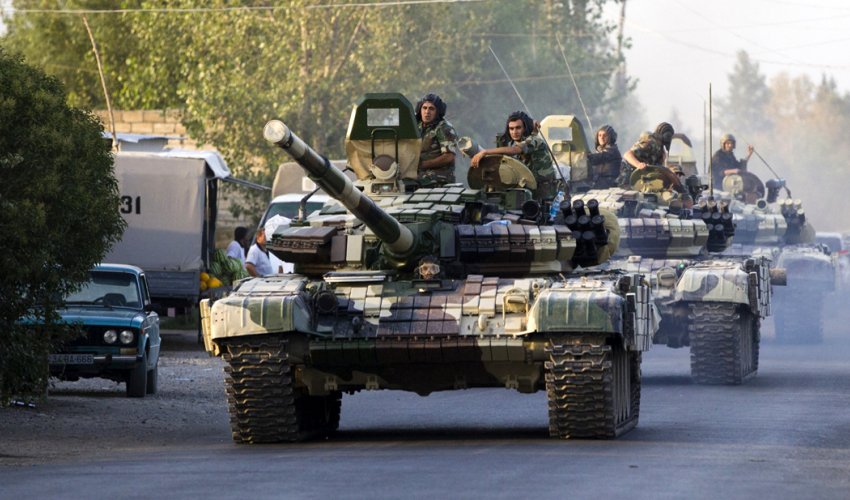
By Catherine Shakdam
With Russia to the north and Iran to the south, the small republic of Azerbaijan sits at a geostrategic crossroads between Eastern Europe and Western Asia.
Although often overlooked, Azerbaijan remains nevertheless an important cog in the Eurasian machine, key to regional stability and to a greater extent world security. Its energy resources and geography have long attracted the interests of extra-regional actors, making this one country of the Caucasus an invaluable asset and political pressure point.
In his book, "The Grand Chessboard,” Zbigniew Kazimierz Brzezinski, U.S. National Security Adviser under the Carter administration, describes Azerbaijan as one of the most significant "geopolitical pivots of Eurasia and key to U.S. security interests.” Thus, though small in size, the country emits a notable political gravitational pull.
Also an emissary to Azerbaijan for the Clinton administration, Brzezinski long advocated strong ties with Baku, asserting that as a country holding rich energy resources and having deep ties to the international powers along its borders, Baku is uniquely situated to play a pivotal role in regional affairs. Although his assessment was made some 16 years ago, regional realities vis a vis the United States remain as relevant as ever, especially in light of the U.S. government’s negative stance toward Russia and Iran.
"Due to its geography, Azerbaijan has a sensitive location that presents itself as a defensive shield for the Caspian Sea: it opens or blocks the access to many significant extra-regional actors, oil and gas thirsty,” said Inessa Baban, a specialist on post-Soviet countries with a strategic military research institute under the French defense ministry, to MintPress News.
"Baku has a pair of keys to the rich energetic Caspian Sea region, whose place in the global geopolitics of energy is increasing proportionally to the degree of instability in the Middle East.”
Sometimes compared to Afghanistan in that events in Azerbaijan are seldom confined to its territorial borders and carry implications that ripple beyond the region, political developments in Baku have been subject to much international scrutiny of late, as tensions with Armenia over the Nagorno-Karabakh region have devolved into calls for war.
A state of the Soviet Union until Oct. 18, 1991, Azerbaijan was once an axis of Moscow’s energy policy strategy, the Kremlin’s jewel in the Caucasus. In fact, Baku’s energy potential and its opening onto the Caspian Sea prompted Soviet Russia to invade this small state in the first place.
Back in 1920, at a time when Moscow sought to assert communism as the new political regional paradigm, Vladimir Lenin understood the crucial role that Azerbaijan would come to play in securing Soviet Russia’s economic and energy independence. Later, Adolf Hitler, too, would come to covet the Caucasus, acutely aware that whichever power would bring this region to heed would have its thumb on one of the coronary arteries of the world and thus exert unparalleled territorial and political control.
In an interview with the Chicago Policy Review, Elin Suleymanov, a former Azerbaijani ambassador to the U.S., recalled the following historical anecdote:
"There is a 1943 video of Hitler in which one of his generals gave him a cake of the map of Russia and asked him to cut out a piece of his favorite part. He cut out Baku, Azerbaijan. He wanted the oil. Ever since the internal combustion engine, Europeans and the world have looked to Azerbaijan as an important energy provider.”
An important cog in the world’s geostrategic machine, decisions made in Baku ripple far beyond Azerbaijan’s borders. As Fariz Ismailzade, a political analyst based in Baku, explained to MintPress, "Azerbaijan’s policies ultimately carry broad regional repercussions, especially when it comes to its decades’ long territorial dispute with Armenia, its regional arch-enemy.”
The Caucasus’ very own Pandora’s box, the Nagorno-Karabakh dispute holds such sway over the greater region that it could set wheels in motion on the global arena, in much the same way that the assassination of Archduke Franz Ferdinand sent dominoes falling across Europe in the lead-up to World War I.
"This particular territorial dispute is merely the reflection of an overlapping of interests and political wills within the greater region. It was never just about Azerbaijan reclaiming sovereignty over its land,” Russian-based analyst Alireza Noori told MintPress.
Noori explained that resolutions passed by the United Nations Security Council calling for the withdrawal of Armenian troops from the Nagorno-Karabakh region were little more than ink on paper.
"The fact that the U.N.S.C. [United Nations Security Council] was unable to enforce the immediate withdrawal of all Armenian troops from the Nagorno-Karabakh stands testimony to the supra-regional character of this conflict. Yerevan and Baku’s rivalries have been played up to serve others’ agendas. It is so much about why Azerbaijan and Armenia cannot reached an acceptable truce, but more about why haven’t they been allowed to broker a peace agreement,” Noori added.
Indeed, while Azerbaijan’s territorial dispute resembles that of many others — Eritrea and Somalia, Sudan and South Sudan, Israel and Palestine, for example — the influence Azerbaijan has on world dynamics and the manner in which it has leveraged its positions and resources vis a vis international players, mean that Baku’s troubles are no longer just its own.
With powers such as Turkey, the U.S., Russia and Iran looking in, Azerbaijan’s territorial claims against Armenia could lead to a dangerous political and diplomatic unravelling, putting much more than the future of the Caucasus in the line of fire.
Territorial integrity and national sovereignty
At dangerous odds with each other since 1988, when Armenia staked territorial claims on the Nagorno-Karabakh region, a province of Azerbaijan, on the basis that the region is majority Armenian, Baku and Yerevan have been in a state of a semi-permanent war, always tittering on the edge of a knife in the name of national sovereignty and territorial integrity.
Azerbaijan and Armenia’s territorial dispute dates back to 1918, following the disintegration of the Transcaucasian Federation, when both states laid claims to territories they respectively understood as ethnically and historically theirs.
Inter-ethnic clashes first broke out in 1988, after the parliament of the Nagorno-Karabakh Autonomous Oblast (NKAO) in Azerbaijan voted to unify the region with Armenia on Feb. 20, 1988, leveraging the Soviet Union’s military withdrawal in Afghanistan and the fall of communism across Eastern Europe to its advantage. With Moscow losing its grip over the Caucasus, Armenian separatists seized a historical opportunity, exploiting Azerbaijan’s weakness in order to occupy its land. In 1994, following brutal and bloody clashes, Armenia managed to seize control over 16 percent of Azerbaijan’s territories, including the Nagorno-Karabakh region and seven surrounding districts.
Traumatized by years of intense ethnic conflict, Azerbaijan has yet to come to terms with what it perceives as Armenia’s unwarranted and unlawful aggression against its people and its land. An estimated 30,000 people, mostly civilians, were killed in Azerbaijan and over a million were displaced prior to the 1994 cease fire.
With emotions still running high in Baku over allegations that Armenia systematically targeted Azerbaijani nationals on account of their ethnicity and religious affiliations to serve its hegemonic ambitions — Armenia is majority Christian, while Azerbaijan is majority Muslim — Baku is still waiting for the international community to make good on U.N. Security Council Resolutions 822, 853, 874, and 884.
In March 2008 the Security Council called for the unequivocal withdrawal of all Armenian armed forces from Azerbaijan, including the Nagorno-Karabakh region.
An open wound on the young republic’s history, Azerbaijan’s territorial integrity has driven Baku’s foreign and national policies since the late 1990s, pulling the narrative back toward war as foreign powers have proven either unable or unwilling to commit to more than words on paper.
Following a period of relative calm, Baku warned in late November that it would no longer tolerate Armenia’s encroachment on its territories, even if that means an all-out war.
In the wake of a series of attacks against civilian population in Azerbaijan, Azerbaijan’s defense ministry issued an official statement on Nov. 28 to condemn Armenia’s actions against Baku, emphasizing that Armenian troops targeted Azerbaijan’s territories on 51 separate instances in less than 24 hours — a clear violation of the long-standing cease fire agreement.
Days after the defense ministry published such strong warnings against Yerevan, Azerbaijan’s Foreign Minister Elmar Mammadyarov echoed the state’s veiled warnings of military retaliation at the Organization for Security and Co-operation in Europe’s 21st Ministerial Council, held in Basel, Switzerland, on Dec. 4.
"Azerbaijan has repeatedly stated that presence of Armenia’s armed forces on the occupied territories is major destabilizing factor with the potential for escalation at any time with unpredictable consequences,” Mammadyarov told the council.
"Unfortunately, after recent presidential meetings of Armenian and Azerbaijani presidents in Russian resort city of Sochi, Newport city in Wales and last round of talks in Paris, the armed forces of Armenia held provocative large-scale military exercises on the occupied territories of Azerbaijan.”
Baku has yet to engage Armenia on the ground, but its officials have made its abundantly clear in recent weeks that any further acts of aggression will be met with speed and resolution.
With tensions and resentment running high between the two opposing states, the entire region stands to go up in smoke.
"What we see today is the manifestation of foreign powers’ failure to promote peace and regional cooperation in the former Soviet bloc. An opportunity for peace was missed in the 1990s and today we are paying the price for this failure,” political analyst Murad Ismayilov told MintPress.
In "The Grand Chessboard,” Brzezinski warned:
"A power that dominates Eurasia would control two of the world’s three most advanced and economically productive regions. A mere glance at the map also suggests that control over Eurasia would almost automatically entail Africa’s subordination, rendering the Western Hemisphere and Oceania (Australia) geopolitically peripheral to the world’s central continent. About 75 per cent of the world’s people live in Eurasia, and most of the world’s physical wealth is there as well, both in its enterprises and underneath its soil. Eurasia accounts for about three-fourths of the world’s known energy resources.”
This tug of war in the Caucasus, heightened by conflicting foreign agendas, has fueled the fires that burn between Azerbaijan and Armenia, acting as a catalyst for opposing regional agendas. With Russia and Iran both hardening their tones toward the West as their interests in the Middle East clash with that of the U.S. and the European Union, Eurasia could well become a new geopolitical faultline.
(Mintpress News)
ANN.Az

























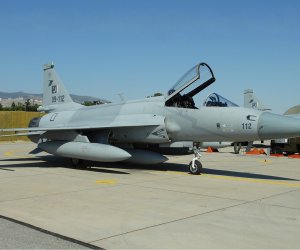
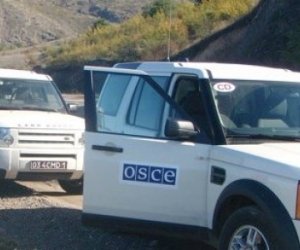
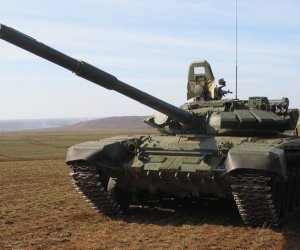
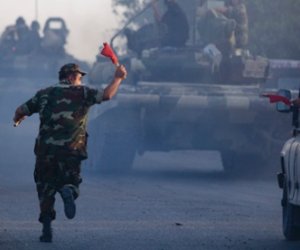
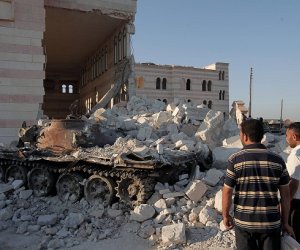
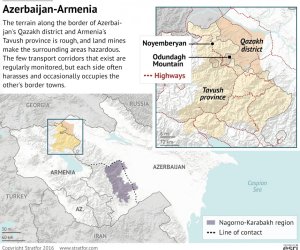
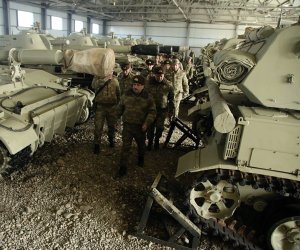
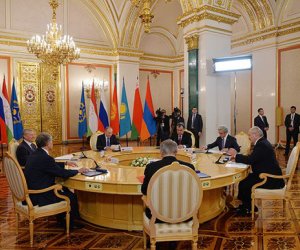



 Photo
Photo 



 Video
Video 

